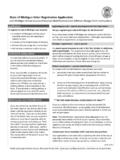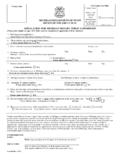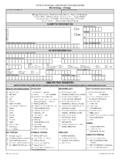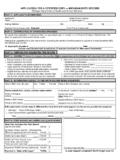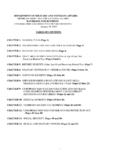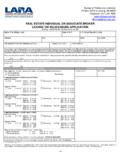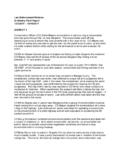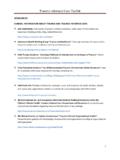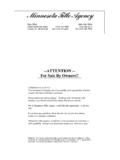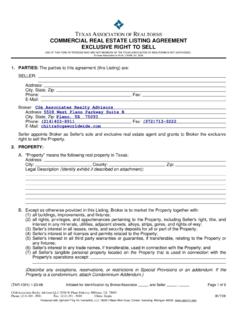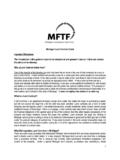Transcription of Frequently Asked Questions Tax Foreclosed Real …
1 Frequently Asked Questions Tax Foreclosed real property Auctions Ver. Prepared by: property Services Division 1 1. What kind of property is the department offering for sale? Parcels offered at our tax Foreclosed real property auctions have been Foreclosed due to delinquent real property taxes. Parcels may be vacant residential or commercial lots, or may have occupied or abandoned structures on them. It is the bidder s responsibility to thoroughly investigate prospective purchase parcels with the local municipality.
2 2. Are the parcels sold at tax Foreclosed real property auctions still subject to former owner rights or other liens? The foreclosure process extinguishes the rights of former owners of interest, including taxpayers, mortgage companies and banks. The only liens that survive foreclosure are those filed by governmental agencies in relation to the environmental protection act. Individuals interested in parcels with associated Department of Environmental Quality (DEQ) liens should contact the DEQ to discuss lien amounts, which may become the responsibility of prospective purchasers.
3 Recorded or visible easements, right of way deeds, and environmental restrictions also survive the foreclosure. The State of Michigan is obligated to serve notice of the show cause hearings and judicial foreclosure hearings to all lien holders. In the rare event that the State of Michigan fails to properly notify the Internal Revenue Service (IRS) regarding property on which the IRS has placed a lien, such IRS liens would survive the foreclosure process. 3. What is the status of the property taxes or other bills associated to the auction parcels?
4 Individuals who purchase parcels at our auctions are responsible for the taxes that are due and payable in the year of purchase as well as any subsequent years taxes. In addition, buyers assume responsibility for remaining years of special assessments beginning in the year of purchase. Buyers are not responsible for costs incurred by the local municipality during the year of the auction. According to Michigan Compiled Laws, Section (13), all liens for costs of demolition, safety repairs, debris removal, or sewer or water charges, which are due December 31 immediately succeeding a sale are canceled effective that December 31.
5 Frequently Asked Questions Tax Foreclosed real property Auctions Ver. Prepared by: property Services Division 2 4. Are buyers responsible for special assessments associated to the auction parcels? Special assessments levied through the year of the auction are included in the minimum bids. All bidders should contact city or township offices to determine if there are any outstanding bonded assessments for future tax years on properties being offered. 5. How does the auction work?
6 Must bidders attend the auction? Will the State accept Internet or telephone bids? Can a bidder register at any time? Registration to bid may take place at any time throughout a day s auction and is open to anyone over the age of 18 with valid identification. Our parcels are sold to the highest verbal bid accepted at the auction. Individuals must attend the auction, in person, or send a representative or agent to act on their behalf. Agents who represent other individuals or business organizations must register with their own personal information, and assume personal financial responsibility for all bids that they make.
7 After winning a bid, agents complete paperwork that indicates to whom the deed should be issued. 6. What sort of payment may be made for parcels purchased at the auctions? How much time does a bidder have to pay for parcels? The full purchase price must be paid the day of the auction. Payment must be received within 1 hour of the final bid for the day. The State will only accept cash or cashier s checks as payment for parcels which, including fees, total $1,000 or less.
8 Purchases totaling more than $1,000 MUST be paid in full by cashier s check. We will NOT accept personal checks, business checks, money orders or credit cards. Cashier s checks should be made payable to the State of Michigan or to the bidder. We cannot accept cashier s checks made payable to corporations or organizations. Bidders should arrange for multiple pre-issued cashier s checks, each limited to $20,000 or less, rather than producing a single large-amount check for payment.
9 The authorized amount for onsite State refunds checks is limited. Larger refunds will require issuances of a State Treasurer s warrant mailed by the Department of Treasury in Lansing. Frequently Asked Questions Tax Foreclosed real property Auctions Ver. Prepared by: property Services Division 3 7. What sort of deed is issued by the State? Does the State offer title insurance for these parcels? The State issues quit claim deeds for parcels sold at our tax Foreclosed real property auctions.
10 The State does not offer title insurance, nor does it claim that title insurance companies will insure such parcels. 8. Once a parcel is sold, how soon may the buyer take possession of structures or evict tenants? Immediately after purchase, buyers should take steps to secure their equity in the property by securing vacant structures and obtaining homeowners insurance for occupied structures. Buyers should not take possession nor attempt eviction of occupants until they receive copies of their deeds which are issued 30 days after purchase.
